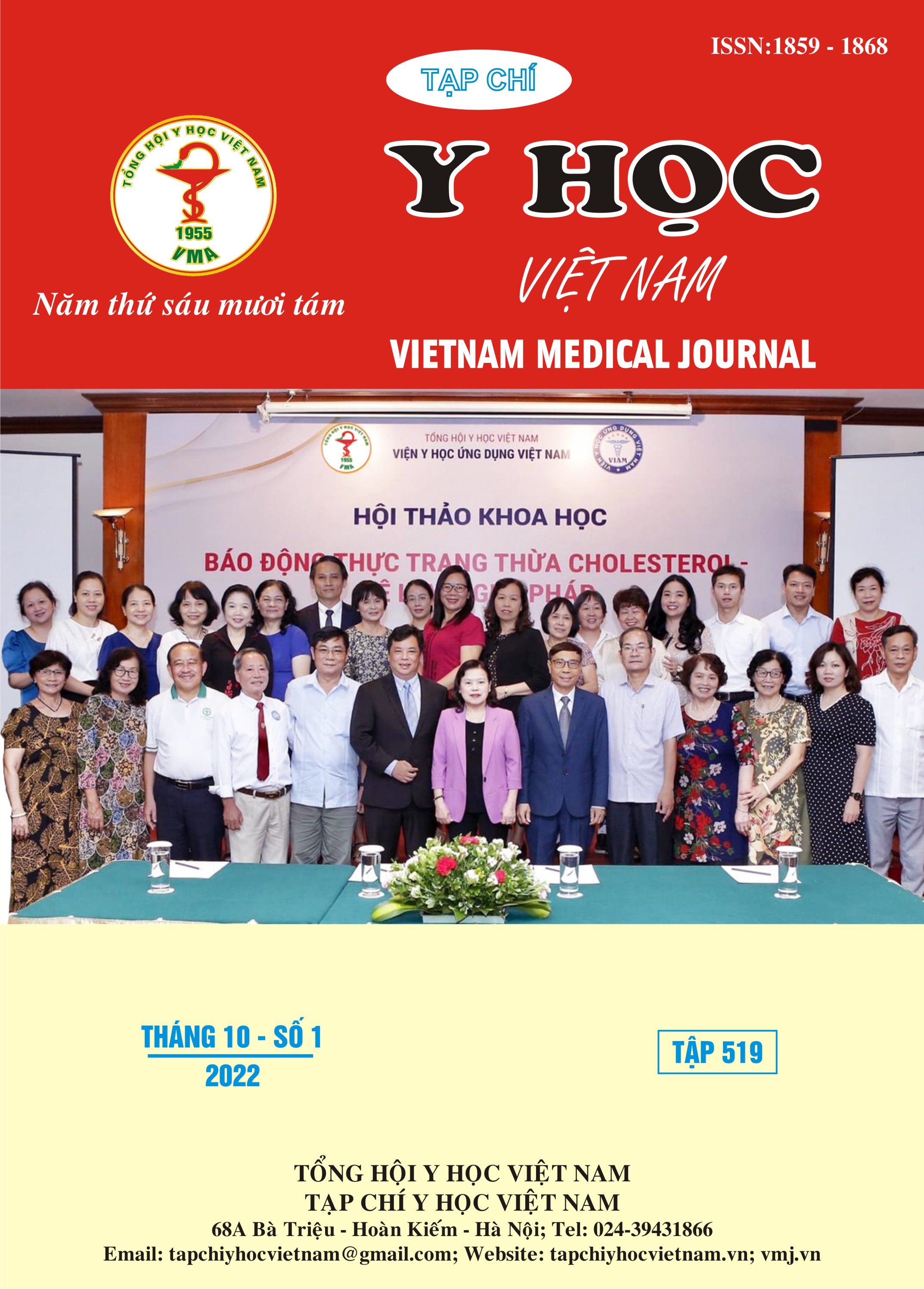CLINICAL CHARACTERISTICS AND PRELIMINARY RESULTS OF TREATMENT ACQUIRED T790M MUTATION NON-SMALL LUNG CANCER WITH THIRD GENERATION TKIs – OSIMERTINIB
Main Article Content
Abstract
Objectives: The aims of our study were to access clinical characteristics and investigate response rate and related factors of third-generation tyrosine kinase in acquired T790M mutation NSCLC. Patients and Methods: Clinical trial, no control group. From January 2018 to June 2022, we enrolled 42 patients have acquired T790M mutation. All patients were treated with osimertinib. Tumor response rate, other related factors were determined. Results: Mean age 55.6 ± 12.4; female 52.4%, non-smokers 83.3%. Duration of first-line treatment >12 months was 60.1%. Primary tumor progression was the most common with 54.8%. The most re-biopsy site is peripheral lymph nodes with 46.2%; 38.1% of cases detected T790M mutaion by blood samples, 9.5% of cases of negative blood samples were confirmed by tissue samples. Complete response 2,4%. Partial response rate was 78,6%. Disease control rate was 92,9%. CNS response rate was very impressive 85,7%. Good performace status has high response rate. Age, gender, smoking status, EGFR mutation and T790M detected by blood or tissue are not related to response rate respectively. Conclusion: Advanced non-small cell lung cancer patients has acquied T790M gene mutation are common in female, non-smokers, and have a duration of first-line therapy of more than 12 months. Osimertinib has a high response rate, especially with CNS metastases.
Article Details
Keywords
third-generation tyrosine kinase, acquired T790M mutation lung cancer
References
2. Trần Văn Thuấn Lê Văn Quảng, Nguyễn Tiến Quang (2019), “Ung thư phổi”, Hướng dẫn chẩn đoán và điều trị một số bệnh ung thư, 176-187.
3. Khozin S., Weinstock C., Blumenthal G. M. et al (2017), Osimertinib for the Treatment of Metastatic EGFR T790M Mutation-Positive Non-Small Cell Lung Cancer, Clin Cancer Res. 23(9), 2131-2135.
4. Mai Trọng Khoa Trần Đình Hà, Phạm Cẩm Phương và CS (2016), Xác định đột biến gen EGFR trên bệnh nhân ung thư phổi không tế bào nhỏ tại bệnh viện Bạch Mai, Tạp chí Ung thư học Việt Nam. 2 (Cận lâm sàng-Hệ thống tạo huyết), 7.
5. Nguyễn Hoài Nga Bùi Diệu, Trần Văn Thuấn, và CS (2014), Một số đặc điểm dịch tễ, lâm sàng, cận lâm sàng ung thư phổi nguyên phát chẩn đoán điều trị tại bệnh viện K trong 10 năm từ 2001 đến 2010, Tạp chí Ung thư học Việt Nam. số 2, 7.
6. Mok T. S., Wu Y. L., Ahn M. J. et al (2017), Osimertinib or Platinum-Pemetrexed in EGFR T790M-Positive Lung Cancer, N Engl J Med. 376(7), 629-640.
7. Pan-Chyr Yang Yuankai Shi, Joseph Siu-kie Au, et al (2012), Molecular Epidemiological prospective study of EGFR mutation from Asian patients with advanced lung adenocarcinoma (PIONEER), J Clin Oncol. 30, 1534.
8. John T., Akamatsu H., Delmonte A. et al (2018), EGFR mutation analysis for prospective patient selection in AURA3 phase III trial of osimertinib versus platinum-pemetrexed in patients with EGFR T790M-positive advanced non-small-cell lung cancer, Lung Cancer. 126, 133-138.
9. Ramalingam S. S., Vansteenkiste J., Planchard D. et al (2020), Overall Survival with Osimertinib in Untreated, EGFR-Mutated Advanced NSCLC, N Engl J Med. 382(1), 41-50.


